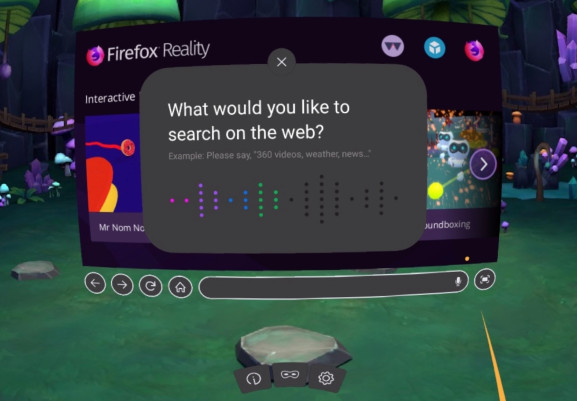
A modified version of Firefox Reality, a popular VR browser for the Oculus Quest, with Metamask enabled. We are focused on AR/VR because we believe that XR not only enhances the feeling of presence in a social setting between two people, but it also strengthens the notion of ownership of a particular virtual good through the ability to virtually "hold" an item.ġ. Openverse is the technological manifestation of these values. One of the best ways in which experiences and content creators can create such forward-looking communities, is through a decentralized form of ownership, in which all participants of the network benefit from the overall network's growth.Ĥ. We believe that for an open Web ecosystem to thrive, we need alternative methods of monetizing experiences and content in a way that is not extractive from the user, but provides ways for the users of said experiences to benefit in a way that is non zero-sum.ģ. The plan for Facebook here is obvious - to monetize the attention of users in VR headsets with advertisements.Ģ. Recently, it has decided to force its users to sign in with a Facebook account rather than a separate Oculus account, causing some users to even be locked out of using their headsets if their Facebook account was deemed "suspicious". Facebook controls a large market share of the VR hardware market with Oculus. And Mozilla is willingly giving up the project, after it previously admitted that it needed to carefully manage its resources as it downsized over the years.īefore the COVID-19 pandemic and in mid-pandemic, the company has endured multiple rounds of layoffs, citing a "refocus" as its strategy.We are building the open, permissionless and user-owned metaverse of the future.ġ. While Firefox Reality isn't the Firefox most people use, it was a project that is in line with the upcoming trend, spearheaded by Meta and some others. This is because Mozilla is company known for creating the popular Firefox web browser. At Mozilla, we will continue to invest in new and emerging technologies."

"We are excited about Igalia building on the legacy of Firefox Reality and look forward to good things to come from it. Four years ago, we launched Firefox Reality, a browser for mixed reality, and our exploration in browsing in new and emerging realities," wrote Mozilla in a blog post. "Mozilla’s mission is to make sure the Internet remains open and accessible to all. In other words, the underlying technologies of Firefox Reality shall continue to live, with Mozilla saying that "the Firefox Reality browser technology will continue under Igalia where they will uphold the same principles we started when we created Firefox Reality - an open source browser that respects your privacy."įor its part, Mozilla mentioned that it has plans for the future, hinting the it's not done just yet. "Since then, more mature standalone devices have entered much wider consumer markets and the Firefox Reality Browser project needed new investment, updates and nurturing." "Firefox Reality was an interesting and important development that began in Mozilla Research while XR devices were still quite young," Igalia said on the Wolvic website.

It is planning to launch the browser to the Huawei AppGallery and the Oculus app store "very soon," with the promise that "more options will follow" at a later date.
Mozilla firefox reality oculus ar vr download#
Just like Firefox Reality, Wolvic is using the WebXR standard to enable VR and AR experiences on websites, rather than requiring users to download standalone app.Īccording to Igalia on its website post, Wolvic's initial focus is to pick up where Firefox Reality leaves off. Instead of further developing the project, Mozilla is handing it over to Igalia with a "somewhat beta" browser called Wolvic.

Mozilla is discontinuing the browser, simply because the project only targeted a very specific niche market that for Mozilla, wasn't generating sufficient user interest.


 0 kommentar(er)
0 kommentar(er)
